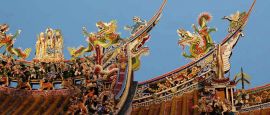Taiwan: Doing business & staying in touch
Doing business in Taiwan
Taiwanese business culture blends traditional values with modern professionalism. While the environment is generally courteous and efficient, understanding a few key points of etiquette can go a long way in building trust and respect with local counterparts.
Politeness and humility are highly valued in Taiwanese interactions. It's common to begin meetings with a polite exchange of business cards—always presented and received with both hands, accompanied by a slight nod. Take a moment to look at the card before putting it away respectfully, ideally in a business card holder rather than a pocket.
Hierarchy and seniority play a significant role in Taiwanese companies. Decisions are often made at the top, so it's important to show deference to senior figures in meetings. Titles and formal forms of address (such as "Manager Chen" or "Director Lin") are used frequently, and interrupting someone more senior is considered impolite.
Punctuality is essential. Arriving late for meetings may be seen as disrespectful or disorganised. Dress tends to be conservative—suits and ties for men, smart businesswear for women—especially in more traditional industries such as finance or manufacturing.
When it comes to communication, Taiwanese professionals are generally tactful and indirect. Open disagreement or confrontation is avoided in favour of maintaining harmony. If you're discussing sensitive topics, do so diplomatically. A "yes" may sometimes mean "I understand" rather than agreement, so watch for non-verbal cues and follow up in writing if needed.
Business meals are common for building rapport, often in restaurants rather than offices. If invited, it's polite to wait for the host to signal the start of the meal. Toasting is customary, and if you're offered a drink, it's considered good form to accept, even if only a sip.
Gifts are not mandatory but are appreciated, especially when meeting someone for the first time or returning after an absence. Avoid giving clocks or anything in sets of four, as these are associated with bad luck. Wrap gifts neatly and present them with both hands.
Taiwan's economy is one of Asia's most dynamic and resilient, built on a mix of high-tech innovation, export-driven industries, and an increasingly diverse service sector. Though modest in size, the island punches well above its weight on the global stage, particularly in technology and manufacturing.
Often referred to as a global hub for semiconductors and electronics, Taiwan is home to some of the world's leading tech companies. Its components are found in everything from smartphones and laptops to electric vehicles and satellites. The manufacturing sector also remains strong, producing everything from machinery and petrochemicals to bicycles and textiles.
While industry continues to be the backbone of the economy, Taiwan's services sector—including finance, tourism, retail, and education—has grown rapidly in recent decades. Cities like Taipei have emerged as regional centres for innovation and entrepreneurship, supported by a highly educated workforce and robust infrastructure.
Agriculture plays a smaller but still culturally significant role, with Taiwan known for its tea plantations, tropical fruits, and niche exports such as orchids and aquaculture products. Local farmers' markets and traditional food production are also a source of national pride.
Taiwan has long been active in global trade, with close economic ties to major markets in Asia, North America, and Europe. Its economy is marked by a strong export orientation, a stable currency, and prudent fiscal management, contributing to its reputation as a safe and reliable place to do business.
While external challenges occasionally test Taiwan's economic stability, the island's adaptability, innovation, and entrepreneurial spirit have helped it weather global shifts and maintain steady growth.
Electronics, machinery, optical equipment, metal, plastics, chemicals, vehicles, and textiles.
Keeping in Touch in Taiwan
Mobile phone coverage in Taiwan is excellent, with strong reception in cities, towns, and most rural areas. The country operates on GSM, 4G, and 5G networks, and roaming is available for most international carriers, though it can be expensive. Visitors can easily purchase prepaid SIM cards at the airport, convenience stores, or mobile shops, with major providers including Chunghwa Telecom, Taiwan Mobile, and FarEasTone. A passport is required to register a SIM card. Data plans are affordable and typically include generous allowances for both calls and internet use.
Wi-Fi is widely available across Taiwan, especially in urban areas. Most hotels, cafés, restaurants, and shopping centres offer free Wi-Fi, and speeds are generally fast and reliable. Taiwan also has a network of public Wi-Fi hotspots, including the government-run iTaiwan service, which tourists can access by registering their passports at an airport service desk or tourist information centre. For extended travel or rural stays, portable Wi-Fi routers can be rented at airports or online before arrival.
Taiwan has one of the freest and most vibrant media landscapes in Asia. Press freedom is protected by law, and the country consistently ranks highly in global media freedom indexes. A wide range of newspapers, television stations, radio channels, and online platforms offer coverage of both domestic and international news, reflecting a variety of viewpoints.
Television remains a popular source of news and entertainment, with major networks broadcasting in Mandarin, as well as some regional programming in Taiwanese Hokkien and other local languages. Cable TV is widely available, and international news channels such as CNN, BBC World News, and Al Jazeera can often be found in hotels and urban households.
The majority of young people and urban residents consume their news online, and Taiwan's digital media sector is fast-growing, with platforms like Line, Facebook, and YouTube playing a major role in information sharing. There is also a strong culture of citizen journalism and independent media, supported by Taiwan's open internet and democratic environment.
While political bias can be noticeable in some outlets, media in Taiwan is diverse and openly critical when needed—an essential feature of the island's democratic life.








 You know where
You know where